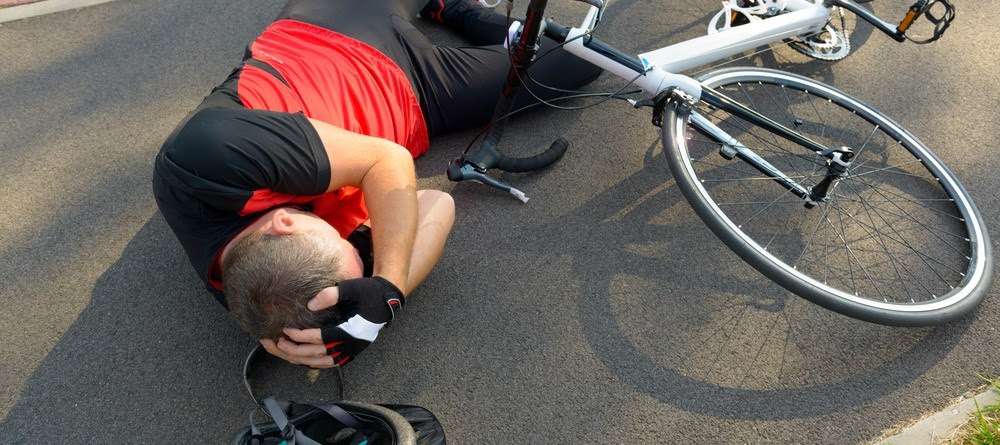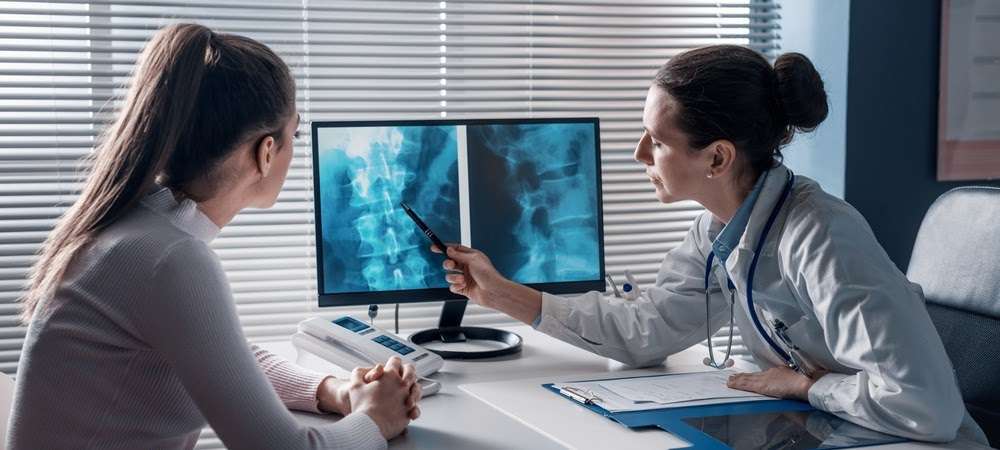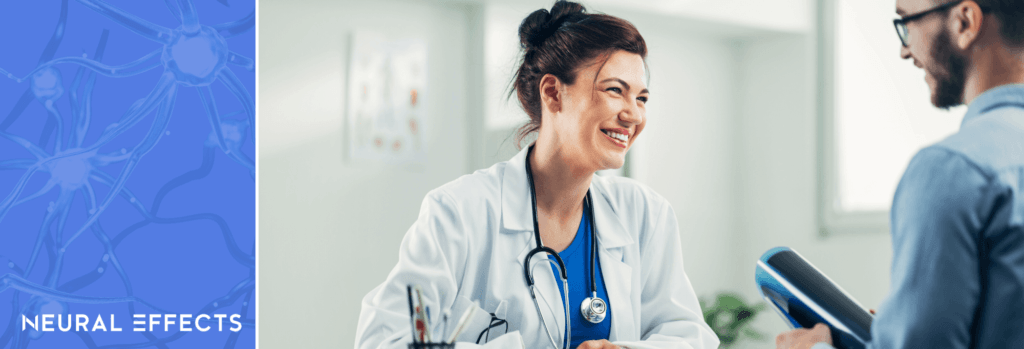No two concussions are the same. Some patients recover without intervention, and others need help to feel better. And those who do need medical assistance may need to involve different types of doctors.
Some patients need specialists to address different symptoms, for example:
- Neuropsychologists to improve mood swings and cognitive issues;
- Vision therapists to address light sensitivity and blurry vision;
- Vestibular therapists to improve balance and decrease dizziness.
Concussion care should be seen as a collaborative process involving different specialists, from the initial diagnosis through treatment and follow-up during recovery.
In this article, we answer the following questions:
- When should I see a doctor for a concussion?
- What kind of doctors treat concussions in emergency care, general medical care, and specialized care?
- How do I find a concussion doctor near me?
If you live in Provo, Salt Lake City, or anywhere else in the Utah valley area, we can help you recover from your concussion and reduce your chance of long-term symptoms. We are in network for most types of medical insurance. Schedule your evaluation today.
Do I Need to See a Doctor for My Concussion?

When in doubt, always seek medical attention for a head injury. Most people who suffer a concussion recover quickly and experience only mild symptoms, but a portion develop persistent symptoms and need specialized treatment.
That said, it can be difficult for someone without medical training to distinguish between a concussion and a more severe injury, such as a fractured skull or bleeding in the brain. If you experience any of these symptoms, seek immediate medical help:
- Severe neck pain
- Double vision
- Weakness or tingling/burning in arms or legs
- Severe headache or worsening severity
- Seizures
- Suspicion of cervical spine injury or skull fracture
- Slurred speech
- Loss of consciousness
- Repeated vomiting
- Increasing confusion or irritability
- Unusual behavior
- Differently sized pupils
- Drowsiness
Even if you’re not experiencing any of these urgent symptoms, it’s good to seek a doctor’s evaluation. This is especially true if you’re struggling with headaches, balance problems, foggy thinking, emotional changes, blurred vision, memory loss, or other common concussion symptoms.
Receiving the right concussion treatment early on reduces your risk of developing a long-term condition known as post-concussion syndrome (PCS). Once your symptoms persist beyond three months, they likely will not go away without treatment in a rigorous concussion program. Getting treatment early means you’re more likely to recover quickly and return to your normal way of life.
What Kind of Doctors Can Treat Concussions?

The type of doctor (or doctors) you need depends on your brain injury and how long ago it happened.
Here’s a quick rundown of the healthcare providers you may encounter:
- Emergency care:
- ER doctors
- Neuroradiologists
- Neurosurgeons
- General care:
- Family physicians/pediatricians
- Sports medicine practitioners
- Physical medicine and rehabilitation (PM&R) physicians (physiatrists)
- Specialized care:
- Neurologists
- Neuropsychologists
- Therapists
- Endocrinologists
If you live in Provo, Salt Lake City, or anywhere else in the Utah valley area, we can help you recover from your concussion and reduce your chance of long-term symptoms. We are in network for most types of medical insurance. Schedule your evaluation today.
Emergency Care

Emergency Room Doctor
ER doctors can assess your injury and request diagnostic imaging, such as a CT scan, if they suspect a brain bleed or a skull fracture.
They can also arrange for you to see a neurosurgeon or neurologist if they feel this is needed. If you have a life-threatening injury, they may transfer you to an Intensive Care Unit (ICU).
The main disadvantage of seeing an ER doctor is that they don’t specialize in concussions. They may not follow the latest treatment recommendations or provide adequate follow-up care after your time in the ER. You can read further about the pros and cons of ER vs urgent care centers and concussion clinics for concussion management.
Neuroradiologist
You will only come across a neuroradiologist if you need a CT or MRI scan. You may never actually meet in person, but they will be an essential part of your care team.
While reading your scan, they look for signs of bleeding or swelling in the brain, as well as skull fractures or evidence of blood clots. Neuroradiologists may also check your spinal cord if you’ve suffered whiplash after a car accident, for example. They might order a magnetoencephalography (MEG) scan if you’re experiencing seizures.
Neurosurgeon
In general terms, neurosurgeons diagnose, assess, and treat disorders of the nervous system, including brain injuries.There is a common misconception that they only operate on the brain, but they also treat peripheral nervous system disorders, which can affect any part of the body.
As described earlier, neurosurgeons may consult on your treatment, especially if there is evidence of brain bleeding or skull fracture which may need surgery. In fact, in an ER setting, neurosurgeons may be the only “concussion experts” that patients encounter.
Most neurosurgeons are familiar with the current diagnostic and management guidelines for concussions. Their extensive knowledge about head injuries gives them an advantage in educating patients about the possible consequences of their injury.
General Medical Care

Pediatrician, General Physician, or Primary Care Provider
Instead of going to the ER, some patients opt to visit a general physician (or a pediatric physician for children) after a concussion. While a primary care provider can diagnose a concussion, these doctors often do not have the necessary training or infrastructure to treat and manage concussion patients. Nevertheless, some insurance companies require you to visit a family doctor to get a referral for a concussion specialist.
While some general physicians give solid concussion advice, many have not kept up with the latest research on concussions. They often recommend staying in a dark room until symptoms disappear. However, several studies have shown that this approach — commonly called ‘cocooning’— is not beneficial to recovery.
Current research now supports a gradual return to normal activity starting 24-48 hours after the injury. Unfortunately, it takes time for new best practices to percolate through the medical community.
Sports Medicine Physician
Sport medicine physicians are trained to provide care for most sports injuries, including sports concussions. Many have experience serving as sideline team physicians at all levels of sport.
These doctors can assess athletes immediately after a concussion to test memory, balance, cognition, and strength. If they suspect a severe injury, they can refer patients for imaging tests like a CT scan or an MRI. They’re usually well-versed in the return-to-play protocol to ensure that patients have recovered fully before returning to sport. They may also collaborate with athletic trainers to supervise their patients’ return to full health.
Physical Medicine and Rehabilitation (PM&R) Physician
Physical medicine and rehabilitation (PM&R) physicians can diagnose patients with a mild traumatic brain injury and provide treatment as needed. Look for those who specialize in concussion.
Usually, these specialists work closely with physical therapists, psychologists, and other medical professionals to develop a treatment plan tailored for each patient. They can prescribe different therapies, like vestibular or vision therapy, to help patients with specific symptoms.
Neurologist
Neurologists can provide an initial concussion diagnosis, but not all of them provide adequate treatment. Neurology programs offer very little training on how to treat concussions beyond initial assessment. If you visit a neurologist, look for one with specialization in concussion, such as a sports neurologist.
Specialized Care for Concussion Patients

Some healthcare professionals are uniquely suited to concussion treatment, including various therapists, neuropsychologists, and even endocrinologists.
Therapists
Most therapists are not medical doctors, but they play a key role in the treatment of concussions. The exact therapy you need for brain health depends on the symptoms you’re experiencing.
Common types of therapists for concussion patients include:
Speech and language pathologists: Also known as cognitive therapists, these specialists can help concussion patients with cognitive or language problems, such as memory, reasoning, and word retrieval. If you’re experiencing headaches from prolonged periods of concentration, or you have difficulty keeping a conversation going because you can’t think of the right word, you may benefit from cognitive therapy.
Occupational therapists: Occupational therapists might help with physical and cognitive symptoms in concussion patients, including fatigue, pain, balance and dizziness issues, light and noise sensitivities, exercise intolerance, and sleep problems. These therapists also have a role in screening for more serious symptoms, such as vision impairments, and may subsequently refer patients to appropriate specialists. Just keep in mind that occupational therapy is often designed to help patients cope with symptoms rather than fully resolve them. Look for a therapist with experience in neurocognitive rehabilitation for concussion and not just general brain injury rehab.
Physical or neuromuscular therapists: Physical therapists can help concussion patients with issues such as balance problems, hand-eye coordination, and general fitness.
This type of therapy can be particularly helpful for concussion patients who experience neck pain and limited movement, for example. Physical therapists can improve spine mobility and implement strategies to decrease discomfort.
Vision therapists: Many concussion symptoms stem from vision problems, such as light sensitivity, blurred vision, and difficulty focusing. To address these issues, vision therapists work on skills like eye-tracking, focusing, and eye teaming (how eyes work together).
Vestibular therapists: Vestibular therapists can help concussion patients who feel dizzy and off-balance. After an initial evaluation to assess symptoms, vestibular therapists offer customized exercises to address specific problems. They might use gaze stabilization exercises to improve control of eye movement, for example, or habituation exercises for patients who experience balance problems when they move around.
Neuropsychologists
Over the past 20 years, neuropsychology has played a vital role in identifying symptoms associated with concussions, monitoring recovery, and encouraging return to normal activities.
Neuropsychologists can assess a patient’s cognitive and psychological brain function after a brain injury. This usually involves a neuropsychological evaluation to assess memory, attention, reasoning, and other cognitive skills. After cognitive testing, neuropsychologists can provide education and reassurance, address lingering symptoms, and treat emotional problems that arise during the recovery period.
Endocrinologists
These doctors cannot diagnose concussions, but they can nevertheless be very helpful during recovery. Some concussion patients experience hormonal problems which can be diagnosed and treated by endocrinologists.
If you’re experiencing changes in weight, muscle aches, excessive thirst, anemia, severe fatigue, headaches, or dizziness, we recommend consulting an endocrinologist. Some women may experience changes to their menstrual cycle while men may experience erectile dysfunction.
Concussion Doctors in Utah

Neural Effects is the best place to receive treatment for a recent concussion in Utah. Whether you just hit your head today or it’s been a few weeks and your symptoms are just not going away, we can offer a more detailed assessment than most doctors provide and follow it up with tailored therapy.
During your assessment, we’ll obtain a detailed description of your symptoms and ask you to rank their severity. Along with your medical history, this information helps us understand what systems have been affected by your brain injury so we can determine the best treatment for you. For example, if you’re struggling with balance, you’ll spend more time doing vestibular exercises; if most of your symptoms are related to vision, our therapists will emphasize eye-related exercises.
Next, we administer a series of physical exams, including a cranial nerve and a cervical spine exam. These exams help us determine how severe your injury is and whether you need further treatment from a neurosurgeon. The initial assessment ends with a Balance Error Scoring System (BESS) test and a vision test.
The results from these exams will influence the type of therapy you will receive during our treatment. Typically, patients receive three sessions every week for two weeks, but this can be adjusted as needed.
An essential part of every session involves cardio exercise, typically on a stationary bike or a treadmill. During these exercises, our physical therapists make sure your heart rate increases enough to promote healthier blood flow in the brain but not so much as to trigger severe symptoms. Exercising at this sub-symptom threshold can be challenging to do without a therapist.

Treatment involves a variety of therapies to address different symptoms. This includes:
- Vestibular therapy to treat balance issues, including dizziness and vertigo
- Vision therapy to treat vision-related issues, such as blurry vision and light sensitivity
- Neuromuscular therapy as a form of physical therapy involving massages and stretches of affected areas, such as the neck and shoulders
- Cognitive therapy to work on attention, memory, word retrieval, and more
At the end of each session, our therapists will give you some exercises to do at home. Usually, this includes aerobic exercise, cognitive games, and controlled breathing and relaxation techniques. Completing these exercises maximizes your chances of a complete recovery.
Some types of therapy may be completed via telehealth appointments; if you live further away from our clinic, let us know and we can discuss treatment options.
If you live in Provo, Salt Lake City, or anywhere else in the Utah valley area, we can help you recover from your concussion and reduce your chance of long-term symptoms. We are in network for most types of medical insurance. Schedule your evaluation today.
Concussion Doctors Near You

If you can’t make it to our rehabilitation program in Utah, use this list of databases to find a concussion doctor near you. We cannot advocate for any practice in particular; these are to give you a starting point for your concussion recovery journey.
Concussion Clinics:
- https://concussionfoundation.org/concussion-resources/concussion-clinics
- https://www.fyzical.com/Locations
- https://www.brainline.org/resource-directory
- https://www.mayoclinic.org/appointments/find-a-doctor
- https://clinics.completeconcussions.com/
- https://concussioncareproviders.com/
Physical Medicine & Rehabilitation (PM&R):
- https://www.abpmr.org/PhysicianSearch/Search
(Note: Choose “brain injury” as the area of practice.)
Neuropsychiatrists and Neurologists:
- https://application.abpn.com/verifycert/verifyCert.asp?a=4
(Note: Choose “Brain injury medicine” as the area of speciality.)
Vision Therapy:
Physical Therapy:
Vestibular Therapy:
Occupational Therapists:
Speech and Language Pathologists:
Sports Medicine Physicians:
If you live in Provo, Salt Lake City, or anywhere else in the Utah valley area, we can help you recover from your concussion and reduce your chance of long-term symptoms. We are in network for most types of medical insurance. Schedule your evaluation today.
